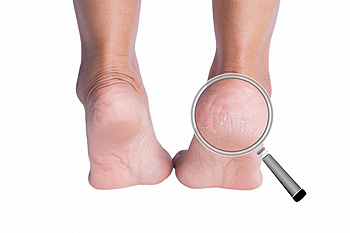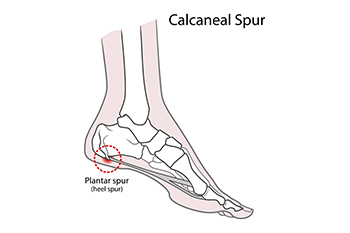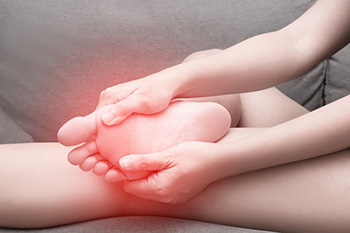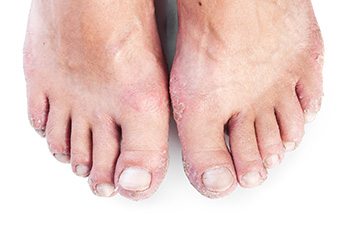Items filtered by date: June 2023
How Do Heel Fissures Differ From Cracked Heels?

Heel fissures are cracks or breaks in the skin of the heels and usually form from intense dryness and thickened skin. These cracks can be superficial or deep, and they may bleed or feel painful. Heel fissures may worsen and become infected or turn into skin ulcers, and it is important to treat them to prevent this from happening. There may be underlying conditions that can lead to heel fissures, which can include, but are not limited to, nutritional deficiencies that can cause the skin to lose moisture, and skin ailments that result in inflammation, itching and dryness. Additionally, cracked heels may happen as a result of wearing footwear that does not allow the feet to breathe. People who have diabetes are at risk for nerve damage to the feet, which is referred to as peripheral neuropathy. One of the several problems this can create can affect the nerves on the feet. Sweating may be reduced or stopped, possibly causing a dry environment for skin fissures to develop. If you are experiencing heel fissures, it is strongly suggested that you seek the care of a podiatrist who can determine what the cause is, and offer correct treatment methods.
If the skin on your feet starts to crack, you may want to see a podiatrist to find treatment. If you have any concerns, contact Dr. John Branwell from Kearny, New Jersey. Our doctor can provide the care you need to keep you pain-free and on your feet.
Cracked Heels
It is important to moisturize your cracked heels in order to prevent pain, bleeding, and infection. The reason cracked heels form is because the skin on the foot is too dry to support the immense pressure placed on them. When the foot expands, the dry skin on the foot begins to split.
Ways to Help Heal Them
- Invest in a good foot cream
- Try Using Petroleum Jelly
- Ease up on Soaps
- Drink Plenty of Water
Ways to Prevent Cracked Heels
- Moisturize After Showering
- Skip a Shower
- Keep Shower Water Lukewarm
- Don’t Scrub Your Feet
If you are unsure how to proceed in treating cracked heels, seek guidance from a podiatrist. Your doctor will help you with any questions or information you may need.
If you have any questions, please feel free to contact our office located in Kearny, NJ . We offer the newest diagnostic and treatment technologies for all your foot care needs.
Causes and Remedies for Heel Spurs

Heel spurs, which are often associated with plantar fasciitis, can become painful. They occur when calcium builds up on the bottom of the heel bone. These outgrowths, or spurs, may be caused by foot muscle strains, stretching of the plantar fascia, and a tearing of the membrane that covers the heel bone. Heel spurs are common in athletes who perform sports that require a great deal of running and jumping. Other causes can include gait issues that put extra pressure on the heels, running on hard surfaces, and poorly fitting shoes with inadequate arch support. Excess weight and obesity may also contribute to the formation of heel spurs. In some cases, a person may not experience any symptoms from heel spurs. But others may feel intermittent or chronic pain, especially after running or long periods of exercise. Stretching exercises, pain medication, and shoe inserts are helpful treatment options. For more information on methods to deal with heel spurs, it is suggested that you make an appointment with a podiatrist.
Heel spurs can be incredibly painful and sometimes may make you unable to participate in physical activities. To get medical care for your heel spurs, contact Dr. John Branwell from Kearny, New Jersey. Our doctor will do everything possible to treat your condition.
Heels Spurs
Heel spurs are formed by calcium deposits on the back of the foot where the heel is. This can also be caused by small fragments of bone breaking off one section of the foot, attaching onto the back of the foot. Heel spurs can also be bone growth on the back of the foot and may grow in the direction of the arch of the foot.
Older individuals usually suffer from heel spurs and pain sometimes intensifies with age. One of the main condition's spurs are related to is plantar fasciitis.
Pain
The pain associated with spurs is often because of weight placed on the feet. When someone is walking, their entire weight is concentrated on the feet. Bone spurs then have the tendency to affect other bones and tissues around the foot. As the pain continues, the feet will become tender and sensitive over time.
Treatments
There are many ways to treat heel spurs. If one is suffering from heel spurs in conjunction with pain, there are several methods for healing. Medication, surgery, and herbal care are some options.
If you have any questions feel free to contact our office located in Kearny, NJ . We offer the latest in diagnostic and treatment technology to meet your needs.
Why Live with Pain and Numbness in Your Feet?
Restless Leg Syndrome and Foot Pain

Restless leg syndrome, referred to as RLS and also known as Willis-Ekbom disease, is a condition where an individual experiences tingling sensations and an urge to move the legs. It can also include a desire to move the feet and can be quite uncomfortable. Symptoms of this ailment typically worsen at night and interfere with sleep. While there is no cure for this syndrome, there may be help to relieve symptoms and increase sleep quality. It is beneficial to find the root cause of restless leg syndrome so that treatment can be more effective. Things that can lead to RLS include sleep deprivation, a sedentary lifestyle, diabetes, certain medications, or renal insufficiency. Movement, such as exercise and stretching, consuming healthy foods, and getting massages may help. If you have restless leg syndrome and it is interfering with the quality of your life, it is suggested that you visit a podiatrist for an evaluation and treatment methods that are tailored to you.
Foot Pain
Foot pain can be extremely painful and debilitating. If you have a foot pain, consult with Dr. John Branwell from Kearny, New Jersey. Our doctor will assess your condition and provide you with quality foot and ankle treatment.
Causes
Foot pain is a very broad condition that could be caused by one or more ailments. The most common include:
- Bunions
- Hammertoes
- Plantar Fasciitis
- Bone Spurs
- Corns
- Tarsal Tunnel Syndrome
- Ingrown Toenails
- Arthritis (such as Gout, Rheumatoid, and Osteoarthritis)
- Flat Feet
- Injury (from stress fractures, broken toe, foot, ankle, Achilles tendon ruptures, and sprains)
- And more
Diagnosis
To figure out the cause of foot pain, podiatrists utilize several different methods. This can range from simple visual inspections and sensation tests to X-rays and MRI scans. Prior medical history, family medical history, and any recent physical traumatic events will all be taken into consideration for a proper diagnosis.
Treatment
Treatment depends upon the cause of the foot pain. Whether it is resting, staying off the foot, or having surgery; podiatrists have a number of treatment options available for foot pain.
If you have any questions, please feel free to contact our office located in Kearny, NJ . We offer the newest diagnostic and treatment technologies for all your foot care needs.
How Psoriasis Can Affect the Feet

Psoriasis is an auto-immune skin condition that can affect many parts of the body, including the feet. When it causes a thickening of the skin covered in scales, it is referred to as plaque psoriasis. Symptoms of plaque psoriasis are itchy, dry, and cracked skin. Toenails may become pitted, cracked, or crumbly, and the affected skin may be painful. Scratching the skin leaves it open to infection. Psoriasis of the feet is referred to as pustular and may be the result of banging or rubbing of the area. This produces an itching sensation that can become quite uncomfortable. While there is no known cure for psoriasis, many treatment options are available, including steroid creams, medicated ointments, and moisturizers. For more information about dealing with psoriasis of the feet, it is suggested that you make an appointment with a podiatrist.
Everyday foot care is very important to prevent infection and other foot ailments. If you need your feet checked, contact Dr. John Branwell from Kearny, New Jersey. Our doctor can provide the care you need to keep you pain-free and on your feet.
Everyday Foot Care
Often, people take care of their bodies, face and hair more so than they do for their feet. But the feet are a very important aspect of our bodies, and one that we should pay more attention to. Without our feet, we would not be able to perform most daily tasks.
It is best to check your feet regularly to make sure there are no new bruises or cuts that you may not have noticed before. For dry feet, moisturizer can easily be a remedy and can be applied as often as necessary to the affected areas. Wearing shoes that fit well can also help you maintain good foot health, as well as making it easier to walk and do daily activities without the stress or pain of ill-fitting shoes, high heels, or even flip flops. Wearing clean socks with closed shoes is important to ensure that sweat and bacteria do not accumulate within the shoe. Clean socks help to prevent Athlete’s foot, fungi problems, bad odors, and can absorb sweat.
If you have any questions please feel free to contact our office located in Kearny, NJ . We offer the newest diagnostic and treatment technologies for all your foot and ankle needs.

